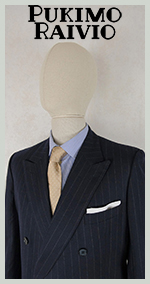Dandyism in Oscar Wilde’s Plays Lady Windermere’s Fan and The Importance of Being Earnest
2November 1, 2018 by Ville Raivio
I have a thing for dandyism. I cannot explain why, but I believe each man has a passion or few. This one is among mine and I’m happy to have found it in the tender high school age. Because this topic will surely bring me manifold riches, girls, and job offers as well, I decided to write my Bachelor of Arts degree for English Philology about it. To avoid the piece being entirely lost in Helsinki University’s archives, I’m sharing it here. Who knows, maybe there are a few souls left somewhere who’ve taken a liking to historical dandies, and those who draw inspiration from the well they are.
Products from Pukimo Raivio
Ralph Lauren, Black Label suit, size 52EU
In this B.A. work, I analyse dandyism in two of Oscar Wilde’s plays. He could have created characters without traits associated with dandyism, but instead we have two main dandy men. This piece first presents the concept of dandyism, then tells the story of George Bryan “Beau” Brummell as he served as the archetype for real-life and imaginary dandies. Then I have a look at the ways dandyism is shown in Lady Windermere’s Fan and The Importance of Being Earnest. The essay also analyses what function dandyism serves in the plays and in the main characters of Algernon Moncrieff as well as Lord Darlington.
The essay’s theoretical background lies in studies that deal with dandyism or its role in Wilde’s works. My references consist of biographies, academic essays, non-fiction books, M.A. works and one doctorate piece. The most important references are Alfred L. Recoulley III’s Oscar Wilde, the Dandy-Artist: A Study of Dandyism in the Life and Works of Oscar Wilde, With Particular Attention Given to the Intellectual Bases of Wilde’s Dandyism, Ellen Moers’s The Dandy: Brummell to Beerbohm, Stephen Calloway’s Wilde and the Dandyism of the Senses as well as William Jesse’s The Life of George Brummell, ESQ., Commonly Called Beau Brummell.
In my analysis, Lord Darlington and Algernon Moncrieff fill the role of an amusing and analytical character, but they have significant differences. Darlington, for one, is conscious of his superficiality while Moncrieff does not take notice of himself. Darlington is ready to abandon his stature and status for the woman he loves, while Moncrieff is ready to abandon his first name. Darlington falls in love with the persona, Moncrieff with the looks.
My study’s finding is that Wilde chose dandyism into his plays as part of his artistic image. His works tell about the upper class life of Britain and poke fun at it. From behind the veil of stylishness and discretion, Wilde’s dandy characters are able to present social critique that Wilde as well launched at his contemporaries. These dandy characters, like Wilde, do this so charmingly that the other characters don’t take offence. To generalise, Wilde’s dandies are akin to Middle Age court jesters, from whose mouths the truth is heard, this truth brings amusement but nothing changes. Omnia mutantur, nihil interit!
My B.A. work can be found through this link:
Dandyism in Oscar Wilde’s Plays Lady Windermere’s Fan and The Importance of Being Earnest
Category Dandyism, Reading | Tags:



Greetings, America!
I have scanned a copy of the Recoulley book but it’s a large file. I can send it to anyone interested in the subject, so I’ll email you now.
Ville, do you have a copy of the Recoulley dissertation? As an “independent scholar” of dandyism without institutional access,I’ve been unable to download a copy.
In any event, I’ve downloaded yours and look forward to reading it.
Best,
Nick